标日中级第1单元测试答案+附听力原文
- 格式:docx
- 大小:688.55 KB
- 文档页数:30
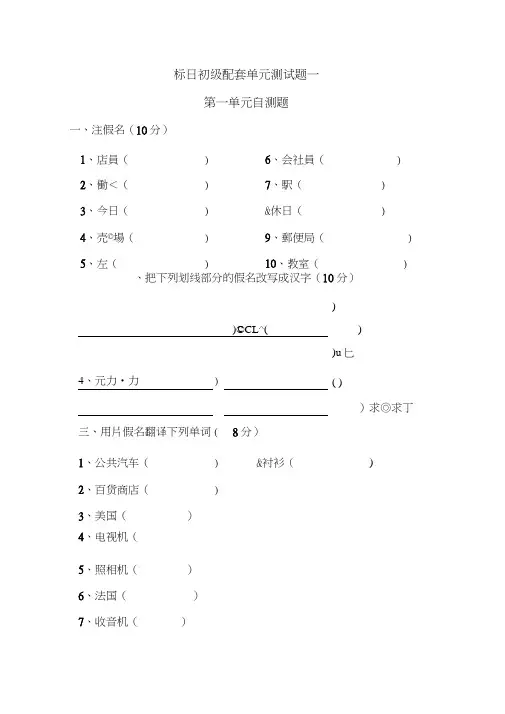
标日初级配套单元测试题一第一单元自测题一、注假名(10分)1、店員() 6、会社員()2、働<() 7、駅()3、今日() &休日()4、売©場() 9、郵便局()5、左() 10、教室()、把下列划线部分的假名改写成汉字(10分)))©CL^())u匕4、元力•力) ( ))求◎求丁三、用片假名翻译下列单词( 8分)1、公共汽车() &衬衫()2、百货商店()3、美国()4、电视机(5、照相机()6、法国()7、收音机()四、填空(12 分)1、田中)会社員2、王n)東京大学()留学生3、才()友達()4、靴①売©場()一階^^()o5、学校总何時()始求◎求丁力、。
6、会社肚9時()( )5時( )( )^^7、王n :)学校肚9時(( )^^o五、在()内填上适当的内容(20 分)1、A: ) ^^^oB:田中^^o2、A:山下中国人疋丁力、。
B: 、山下中国人()。
日本人疋丁3、A:乙料) ^^^oB:乞料总本疋4、A:昨日总日曜日()。
B:5、A:昨日总木曜日U尢力、。
B: 、木曜日()六、从括号中选择适当的词语( 6 分)a Ten b何c本)疋丁力、。
a李we bTn c何)①本疋丁力、。
李wee本疋^。
3、(a b^n cH)本鈴木we©^^o4、田中wea(a学生b会社員cTn)疋丁力、。
、会社員5>^^^^e o(a 乞n b乞乙c^© )靴^<TWV O6、厉肚尢©力Mhea(a ^n b^© cTn)^^^o七、完成下面的短文(10 分)店員:①___________________________________________ 。
客:力M^e©売◎場a乙乙疋丁力、。
店員:as、乞*5^^。
客:乞©力uhea② ________________________________________ 丁力、。
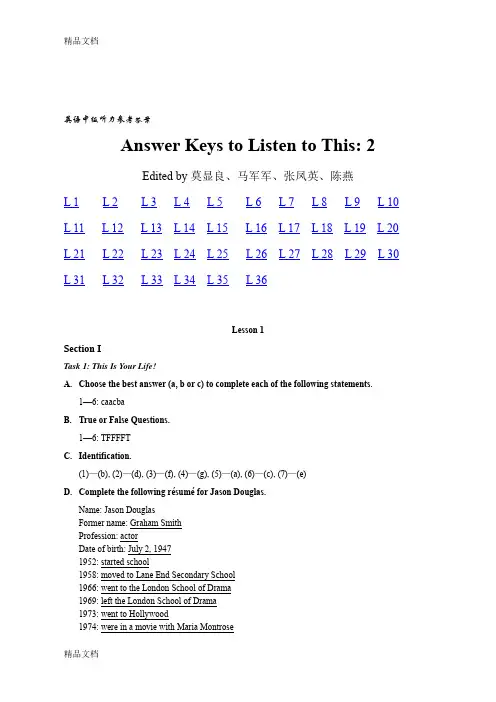
英语中级听力参考答案Answer Keys to Listen to This: 2Edited by莫显良、马军军、张凤英、陈燕L 1L 2L 3L 4L 5L 6L 7L 8L 9L 10 L 11L 12L 13L 14L 15L 16L 17L 18L 19L 20 L 21L 22L 23L 24L 25L 26L 27L 28L 29L 30 L 31L 32L 33L 34L 35L 36Lesson 1Section ITask 1: This Is Your Life!A.Choose the best answer (a, b or c) to complete each of the following statements.1—6: caacbaB.True or False Questions.1—6: TFFFFTC.Identification.(1)—(b), (2)—(d), (3)—(f), (4)—(g), (5)—(a), (6)—(c), (7)—(e)plete the following résumé for Jason Douglas.Name: Jason DouglasFormer name: Graham SmithProfession: actorDate of birth: July 2, 19471952: started school1958: moved to Lane End Secondary School1966: went to the London School of Drama1969: left the London School of Drama1973: went to Hollywood1974: were in a movie with Maria MontroseTask 2: What Are Your Ambitions?A.Give brief answers to the following questions.1.Radio Station QRX.2.For a survey.3.Four.4.Six.5.(1) What’s your name?(2) What do you do for a living?(3) What do you do for fun?(4) What’s the most exciting thing that’s happened to you recently?(5) Who do you admire most in this world?(6) What do you want to be doing five years from now?B.Fill in the following chart with answers that each interviewee gives to the questions.Section IIA.Choose the best answer (a, b or c) for each of the following questions.1—6: abaccbB.True or False Questions.1—4: FTFFC.Fill in the following chart with information about the journey the Roman army madeaccording to Trevor.Designation: D CompanyNumber of men: one hundred and moreJourney: from France to BritainMeans of transcript: boatWeather conditions: stormyFood: cat foodDrink: rain waterConditions of weapons after landing: uselessFighting: noneEquipment lost or damaged: boat lost, guns full of water, supplies of wine lostSoldiers killed or wounded: about ten survivors, all others drowned or killed by coldD.Point out what is not true in Trevor’s story.The following did not exist in Roman times:petrol, newspaper, matches, trousers, tinned food, taps, guns, wine bottles.50 BC could not appear on a coin. 50-55 BC is counting backwards.E.Fill in the blanks according to what you hear on the tape.1.terrible, stormy, or more of us, shut in, so bad, sick, stuffy.2.pushed up onto the sands, climbed out, jumping into the, struggling to the, up to my shoulder,freezing.3.came and took us away, joined, going into the camp, a hot meal, clean clothes, given our pay. Section IIITask 1: Learning to Predict1.Answer: trying to write a letterReason: The speaker’s question suggests he needs a quiet surrounding to do something.2.Hint: the first speaker is a guest complaining about the conditions of Room 43 which is asingle room. The second speaker is a hotel clerk who suggests that the guest move to a double room.Answer: is the only single room available at the momentReason: The phrase “I’m afraid” often suggests a negative or unsatisfying answer.3.Answer: Where on earth did you get it?Reason: The second speaker’s surprised tone shows that the money is out of her expectation and she must be curious about how it is gained.4.Answer: You mustn’t discriminate against someone just because they are married.Reason: The word “but” suggests an opposite meaning.5.Answer: I wouldn’t mind being a prince.Reason: The man’s questioning tone shows he doesn’t agree with the woman.6.Answer: I’m not a workaholic.Reason: The word “but” suggests an opposite meaning.7.Answer: he had been.Reason: “But” and “possibly” both give some hint.Task 2: DictationPassage 1: The KnowledgeBecoming a London taxi driver isn’t easy. In o rder to obtain a licence to drive a taxi in London, candidates have to pass a detailed examination. They have to learn not only the streets, landmarks and hotels, but also the quickest way to get there. This is called “The Knowledge” by London Cab drivers and it can take years of study and practice to get ‘The Knowledge’. Candidates are examined not only onthe quickest routes but also on the quickest routes at different times of the day. People who want to pass the examination spend much of their free time driving or even cycling around London, studying maps and learning the huge street directory by heart.Passage 2: The UndergroundTravelling on the London underground (the ‘tube’) presents few difficulties for visitors because of the clear colour- coded maps. It is always useful to have plenty of spare change with you because there are often long queues at the larger stations. If you have enough change you can buy your ticket from a machine. You will find signs which list the stations in alphabetical order, with the correct fares, near the machines. There are automatic barriers which are operated by the tickets. You should keep the ticket, because it is checked at the destination.Lesson 2Section ITask1: Film EditingA.True or False Questions.1—4: TFTFB.Fill in the following blanks to give a clear picture of what needs to be done before a film isready for distribution.1. The assistant:a. “Synching up” which means matching sound and pictures according to the numbers stampedalong the edge of the film and sound tape.b. “Logging” which means recording the detail version of the film and the sound in a log book.2. The film editor:a. Make a first selection of the best takes.b. Prepare a “rough cut”– an initial version of the film.c. Prepare the “fine cut”– the final form of the film.3. Others:a. Approve the fine cut.b. “Dubbing” which means voices, music, background noises and sometimes special effects areput together.c. The “neg”cutters cut the original negatives on the film so that these match the edited filmexactly.Task 2: A Vision of the FutureA.Choose the best answer for each of the following questions.1—6: abacccB.True of False Questions.1—4: TFTFC.Fill in the blanks to give a clear picture of the problems New York faces in the movie.1.40 million2.have no apartment, sleep on the steps of the building, crawl over sleeping people to get inside.3.nothing will grow, they never see the sun.4.soylent: soylent red, soylent yellow, and soylent green. 2, soybeans, soylent green, oceanplants.5.90 degree.6.electricity, ride bicycles to make it.Section IITask 1: American IndiansA.Answer the following questions briefly.1.1492.2.He thought that he had arrived in India.3.They were kind to them and wanted to help.4.(1) They wanted bigger farms and more land for themselves; (2) More immigrants came fromEurope.5.It was their mother. Everything came from and went back to their mother. And it was foreverybody.6.They started fighting back.7.By 1875 the Indians had lost the fight and had to live in “reservations”.8.The Indians are bad and the White man is good and brave in Hollywood films.B.Choose the best answer for each of the following questions.1—4: acbcTask 2: New AustraliansA.Identification:1.(1)—(d), (2)—(b), (3)—(a), (4)—(c)2.(a) more than 15 million,(b) 160, 000,(c) the year 1851,(d) 700, 000B.True or False questions.1—6: FTFFTTC.Fill in the blanks with events connected with the following time expressions.1.Italiansa.the 1850s and 1860s: Different states in Italy were fighting for independence and someItalians went to Australia for political reasons. Some others went there for gold.b.1891: The first group of 300 Italians went to work in the sugar-cane fields of northernAustralia.c.The end of the 19th century: Some good Italian fishermen went to western Australia.2.Greeksa.1830: The first Greeks went to work in vineyards in south-eastern Australia.b.The 1860s; There were about 500 Greeks in Australia.c.1890; There were Greek Cafes and restaurants all over Sydney and out in the countryside.d.After WWII: Many Greeks arrived in Australia.Section IIITask 1: Learning to Predict1.Answer: It’s good exercise. Keeps you fit.Reason: The word “yeah”suggests that the boy will say something in agreement with the woman’s comment.2.Answer: We turn the music up really loud and start dancing.Reason: The phrase “why not” suggests that the boys will simply dance in the street.3.Answer: They can’t do it like me yet.Reason: The word “but” suggests an opposite meaning.4.Answer: It’s a very old book.Reason: The word “actually” also suggests an opposite meaning.5.Answer: Write down your address and I’ll get the boy to bring them round.Reason: The conversation takes place in a store. If the store owner agrees to deliver the goods, the only thing he wants to know will be the address of the customer.6.Answer: Tell us all about it over dinner.Reason: The woman sounds very much interested in the man’s experience. So she will certainly ask the man to tell her something about it.Task 2: DictationThe Foolish FrogOnce upon a time a big, fat frog lived in a tiny shallow pond. He knew every plant and stone in it, and he could swim across it easily. He was the biggest creature in the pond, so he was very important. When he croaked, the water-snails listened politely. And the water-beetles always swam behind him. He was very happy there.One day, while he was catching flies, a pretty dragon-fly passed by. ‘You’re a very fine frog,’ she sang, ‘but why don’t you live in a bigger pond? Come to my pond. You’ll find a lot of frogs there. You’ll meet some fine fish, and you’ 11 see the dangerous ducks. And you must see our lovely water-lilies. Life in a large pond is wonderful!’‘Perhaps it is rather dull here,’ thought the foolish frog. So he hopped after the dragon-fly.But he didn’t like the big, deep pond. It was full of strange plants. The water-snails were rude to him, and he was afraid of the ducks. The fish didn’t like him, and he was the smallest frog there. He was lonely and unhappy.He sat on a water-lily leaf and croaked sadly to himself, ‘I don’t like it here. I think I’ll go home tomorrow.’But a hungry heron flew down and swallowed him up for supper.Lesson 3Section ITask 1: I Don’t See It That WayA.Conversation 1:1.Choose the best answer for each of the following statements.(1) — (2): ba2.Give brief answers to the following questions.(1)About 6 months ago.(2)It is defective and has ruined 4 of the customer’s favorite cassettes.(3) 6 months.(4)10 days ago.3.Blank-filling.(1)bend the rule, make an exception for, make an exception for(2)adding insult to injury, make good on(3)brought it in, hold me to, onB.Conversation 2:1.Multiple choice. (1) — (2): ba2.True or False Questions. (1) — (4): FTTTC.Conversation 3:1.Give brief answers to the following questions.(1)Single.(2) 5 years.(3)He has been loyal to the company and worked quite hard.(4)Asking for a raise.(5)Bob does his job adequately, but he doesn’t do it well enough to deserve a raise.(6)Take more initiative and show more enthusiasm for the job.(7)To quit his job.(8)That’s a decision Bob will have to make for himself.Task 2: marriage CustomsA.Blank-filling.Speaker: Professor Robin StuartTopic: Marriage customs in different parts of the world; romantic business; arranged marriage; on the day of the wedding; arranged marriages; to have a look at one another; call the whole thing off; the wedding goes ahead; several wives.Conclusion: just as much chance of bringing happiness to the husband and wife as the Western systems of choosing marriage partners.B.True or False Questions. 1 — 3: TFTSection IITask 1: At the Dentist’sA.Multiple Choice. 1 — 4: baccB.True of False Questions. 1 — 6: FTFFTTTask 2: HiccupsA.Give brief answers to the following questions.1.He wants her to help him stop his hiccups.2. 3 hours.3.Everything he can think of.4.She’ll give the man 5 pounds if he hiccups again.5.The man has stopped hiccupping and owes Rosemary 5 pounds.B.Identification.(1) —(b), (2) —(d), (3) —(e), (4) —(a), (5) —(c)Section IIITask 1: Learning to Predict1.Answer: the Chinese then?Reason: “What about” suggests an alternative.2.Answer: they’ll still be hot when you get back.Reason: The woman’s words suggest that the shop is very close to their home.3.Hint: The woman is asking the man to buy a pack of fish and chips from a nearby shop.Answer: there’s a queue.Reason: The phrase “not if” suggests a condition that hinders the fulfillment of an action.4.Answer: a good idea.Reason: The word “yes” shows an agreement.5.Answer: being a machine for that money.Reason: “I wouldn’t mind” suggests that the man will do what the woman doesn’t want because of certain attractive conditions.6.Answer: I want to play drums.Reason: The earlier sentence suggests that the man does not play drum for money.Consequently the explanation must be that he enjoys playing it.Task 2: DictationSleepIt’s clear that everyone needs to sleep. Mo st people rarely think about how and why they sleep, however. We know that if we sleep well, we feel rested. If we don’t sleep enough, we often feel tired and irritable. It seems there are two purposes of sleep: physical rest and emotional and psychological rest: We need to rest our bodies and our minds. Both are important in order for us to be healthy. Each night we alternate between two kinds of sleep: active sleep and passive sleep. The passive sleep gives our body the rest that’s needed and prepares us for active sleep, in which dreaming occurs.Throughout the night, people alternate between passive and active sleep. The brain rests, then it becomes active, then dreaming occurs. The cycle is repeated: the brain rests, then it becomes active, then dreaming occurs. This cycle is repeated several times throughout the night~. During eight hours of sleep, people dream for a total d one and half hours on the average.Lesson 4Section ITask 1: Weather ForecastA.Multiple Choice. 1 — 2: acB.Fill in the following chart.Task 2: The 5 O’clock NewsA.Fill in the following chart.B.Give brief answers to the following questions based on the news report.1.It was closed down by government authorities.2.Testing confirmed that the town had been poisoned be the dumping of toxic chemicals in towndumps.3. 3 weeks ago.4.200.5.Headaches, stomachaches, faintness and dizziness.6.Toxic wastes had leaked into the ground and contaminated the water supply.7.All the residents should leave the area, until the chemical company responsible for the toxicwaste can determine whether the town can be cleaned up and made safe again.C.True of False Questions. 1—6: FTTFFTD.Fill in the following blanks (based on the news report).Teams Playing Result(1) Mexico — France 7 to 6(2) Canada — Argentina 3 to 3(3) Italy — Haiti2 to 1(with 30 minutes left to go)Section IITask 1: What Do You Like for Entertainment?A.Blank-filling.Reporter: Deborah TylerInterviewee: Students of the Brooklyn Academy of Dramatic ArtsMajor: Benny Gross —— pianoKimberley Martins —— modern danceB.Fill in the following chart about how often Benny and Kimberley go to the eight forms ofartistic entertainment.C.Rearrange the forms of artistic entertainment that Benny and Kimberley like, beginning withthe form that each one likes best.Benny: (3)—(1)—(4)—(6)—(2)—(8)Kimberley: (2)—(4)—(1)—(7)—(3)—(8)Task 2: Are You a Heavy Smoker?A.True or False Questions. 1—6: TFTTFTB.Multiple Choice. 1—6: cbcbacC.Blank-filling.Name: Doris BradleySex: femaleAge: 32Amount: 3 packets of 20 a weekFirst experience:Time: at the age of 17Place: at a partyOffered by: boyfriend, not husbandFeeling; awfully grown-upLater: started smoking 2 or 3 a day and gradually increased.Experience of giving up smoking: twice1. Time: 6 months before getting marriedReason: saving upResult: only cut it down from 30 a day, still smoked a little2. Time: when expecting a babyReason: according to doctor’s adviceResult: gave up completely for 7 or 8 months and took it up a couple of weeks after the baby was born, because the baby was being bottle fed.Time when she smokes most:1. watching TV2. reading books3. in company4. with friendsTime when she never smokes:1. doing the housework2. on an empty stomachSection IIITask 1: Learning to Predict1.Answer: They’d be exhausted at the end of each performance.Reason: “Otherwise” suggests a result of the opposite condition.2.Answer: I enjoyed it very much.Reason: “Apart from that I must say” often suggests an opposite statement to earlier comments.3.Answer: I stayed up late to finish it.Reason: “And” suggests that the speaker would finish the book at one sit.4.Answer: the book never really got started at all.Reason: After an opinion of agreement, the phrase “in fact” suggests a further comment; the expression “it’s only honest to say” usually introduces a confession- something whichis probably not as good as the one mentioned.5.Answer: I tend to skip parts that don’t really hold my interest.Reason: “Otherwise” suggests a result of the opposi te condition.6.Answer: it was rather long.Reason: “I must admit” suggests an agreement to the other person’s opinion.Task 2: DictationBooks Belong to the PastSir,I visited my old school yesterday. It hasn’t changed in thirty years. The pupils were sitting in the same desks and reading the same books. When are schools going to move into the modern world? Books belong to the past. In our homes radio and television bring us knowledge of the world. We can see and hear the truth for ourselves. If we want entertainment most of us prefer a modern film to a classical novel. In the business world computers store information, so that we no longer need encyclopaedias and dictionaries. But in the schools teachers and pupils still use books. There should be a radio and televisionset in every classroom, and a library of tapes and records in every school. The children of today will rarely open a book when they leave school. The children of tomorrow won’t need to read and Write at all.M. P. MillerLondonLesson 5Section ITask 1: An Unpleasant TripA.Give brief answers to the following questions.1.The Isle of Wight.2.They were not pleased with their hotel.3.He decided to write to the Manager of Happytours.4. A travel Agency.5.The hotel and travel arrangements.6.They will never book any future holidays through Happytours.B.Fill in he blanks with the words used in the brochure and by Mr. Wilson to describe the hoteland travel arrangement.Task 2: At the Travel AgencyA.Multiple Choice. 1—6: acbbcaB.True or False Questions. 1—6: TFTTFTC.Fill in the blanks with the two things that Miss Bush will do.1.her two friends, to stop over with her on the way back.2.Mr. Adams to stop with her in Cairo.Section IIA Saturday AfternoonA.Identification.Name IdentificationGillian Dr. Carmichael’s new research assistantDr. Carmichael the president of St. Alfred’s HospitalMaurice Featherstone the gardener of the hospitalB.Multiple Choice. 1—6: cbaacaC.True or False Questions. 1—8: FFTF TFTTD.Fill in the blanks with information about Maurice.Name: Maurice FeatherstoneSex: maleAge: oldAppearance: clear, blue, honest eyes; white hair and a pinkish complexionTemperament: gentle and mild-manneredLength of stay in the hospital: 35 yearsReasons for entering the hospital:1.When he was 17, he burnt down his school.2.Over the next few years, there were a number of mysterious fires in his neighborhood.ter he tried to set fire to the family mansion.Visits from family members: No.Bills: paid on time.E.Blank-filling.1.slightly uneasy, unlocked the gates, waved her through2.withdrawn, depressed, normal, kept locked up, all of them, too dangerous to live in normalsociety.3.with the staff, a surprise, let him go out for the afternoon, flower show, quite excited, a birthdaycake, decorated the lounge.Section IIITask 1: Learning to Predict1.Answer: he fails to employ the correct question form.Reason: “Consequently” suggests a result of the facts mentioned earlier.2.Answer: difficulties may still arise.Reason: “even when” suggests that in spite facts, something else still exists.3.Answer: the student may not have clearly heard what was said.Reason: “In other words” is often followed by an explanation in clearer and easier words.4.Answer: may feel angry at receiving such orders.Reason: “However” suggests an opposite fact.5.Answer: whether crops should be used to produce food or should be used to produce fuel.Reason: “That is” is also followed by an explanation.6.Answer: a small industrial sector.Reason: “At the same time” suggests the coexistence of two things. Here prediction is also based on common knowledge.Task 2: DictationThe School Holidays Are Too LongToday the children of this country have at last returned to work. After two months’ holiday pupils have started a new term. How many adults get such long holidays? Two to four weeks in the summer and public holidays--that’s all the working man gets. As for the average woman, she’s lucky to get a holiday at all. Children don’t need such long holidays. In term-time they start work later and finish earlier than anyone else.In the holidays most of them get bored, and some get into trouble. What a waste! If their overworked parents were given more free time instead, everyone would be happier.This isn’t just a national problem either--it’s worldwide.Dates may be different from country to country, but the pattern’s the same. Why should children do half as much work and get twice as much holiday as their parents?Lesson 6Section ITask 1: In the Path of the EarthquakeA.True or False Questions. 1—6: FTFTFFB.Map 1 is a layout of the Skinners’ farm. Mark out the plants and buildings in the map. Then inmap 2 draw a new plan of the Skinners farm after the quake.Map 1:1. farm house2. garden path3. cypress trees4. rose garden5. eucalyptus trees6. raspberry patch7. cow shed8. granaryMap 2:Task 2: A Funny Thing Happened to Me.A.Multiple Choice. 1—6: cabbcaB.Give brief answers to the following questions.st Friday.2.He was a student.3.In London.4.By taxi.5.The taxi got stuck in a traffic jam and the train had left by the time he got to the station.6. 1 hour.7.The station buffet.8.An evening newspaper, the “Standard”.9.At a table near the window.10.He did the crossword puzzle.C.True or False Questions.1—6: FFTTFTD.Blank-filling.1.reached across, opened, took one, dipped, into, popped it into.2.get up and go, pushed back, stood up, hurried out of.Section IIConsolidation: A Very Beautiful StoryA.Give brief answers to the following questions.1. A tape from Gentleman Jim.2.Yesterday.3.Jim’s wife.4.There was a message hidden in the tape.5.Half the police force in London and 3 experts.6.Nothing had been found yet.7.Happy memories and things.8.In his words.B.True or False Statements.1—8: FTFF TTFTC.Discuss with your classmates what message is hidden in Gentleman Jim’s recording.D.Listen to the 2nd part of the policeman’s discussion and list all the things they feel unusualabout Gentleman Jim’s recording.1.Jim keeps telling his wife to play the message over and over again.2.Jim tells his wife that she’ll find something comforting.3.Jim keeps saying “very beautiful” over and over again.4.The speech doesn’t sound natural.E.Listen to Gentleman Jim’s recording again and work out the message.Answer: There are 2 gold bricks in the garden under the big red rose tree.Section IIITask 1: Listening to Predict1.Answer: a glance at the headings of sections or sub-sections will show the order in which theitems are introduced.Reason: “In addition” is followed by a supplementary idea. Prediction here is also based on common knowledge.2.Answer: providing a summary which can be re-read later.Reason: “As well as” is oft en followed by an idea of the same importance as the one before “as well as”.3.Answer: may not appear in a bibliography.Reason: “However” suggests an opposite idea.4.Answer: (no more than try to cover the most important ones here.Reason: “Therefore” sugges ts a result.5.Answer: it doesn’t.Reason: “Unfortunately” suggests that something opposite to one’s expectation will happen.6.Answer: it’s still important.Reason: “Though” suggests that in spite of the fact that follows, something still happens. Task 2: DictationSign LanguageDeaf people, people who can’t hear, are still able to communicate quite well with a special language. It’s called sign language.The speaker of sign language uses hand gestures in order to communicate. Basic sign language has been used for a long, long time, but sign language wasn’t really developed until about 250 years ago. In the middle of the 1700s a Frenchman named Epée developed sign language. Epée was able to speak and hear, but he worked during most of his life as a teacher of deaf people in France. Epée developed a large number of vocabulary words for sign language. Epée taught these words to his deaf students. Epée’s system used mostly picture :image signs. We call them picture image signsbecause the signs create a picture. For example, the sign for sleep is to put both hands together, and then to place the hands flat against the right side of your face, and then to lower your head slightly to the right. This action was meant to show the position of sleep. So we call it a picture image sign.Lesson 7Section ITask 1: Learning a Foreign LanguageA.Multiple Choice. 1—4: bcaaB.True or False Questions. 1—4: FTTFC.Give brief answers to the following questions.1.Albert Humphries.2.Balham, London.3. 4 years.4.He has been going to an evening class and has watched quite a lot of the BBC televisionprogrammes.5.They use a different book in the class.6.They make the same mistakes as he does.7.It means being able to put together the right groups of words and to say them in a reasonablyaccurate way.Task 2: In the LibraryA.Multiple Choice. 1—6: bbcacaB.True or False Questions. 1—6: TTFTFTC.Give brief answers to the following questions.1.Round the corner.2. A 20p a day fine for each book.3.Tahiti.4.No.D.Blank-filling.1. 5 pounds, you damage them, entitles you, 2 records at a time, everything available, be muchmore popular than.2.telephone to renew the books.3.we get back, worth all the bother, some paperbacks in the airport, I’ve been such a nuisance.Section IITask 1: Lessoned World CollegesA.Give brief answers to the following questions.1.On the phone.2.Some information about the college.3.Robert Creighton.4.Julian’s friend in Spain.。
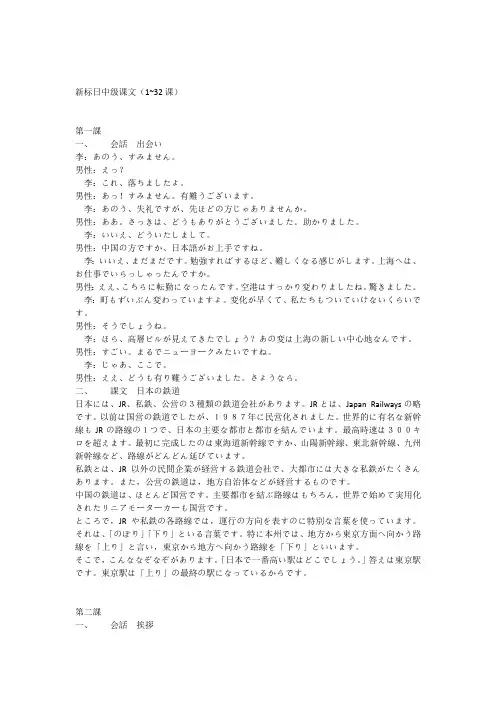
新标日中级课文(1~32课)第一課一、会話出会い李:あのう、すみません。
男性:えっ?李:これ、落ちましたよ。
男性:あっ!すみません。
有難うございます。
李:あのう、失礼ですが、先ほどの方じゃありませんか。
男性:ああ。
さっきは、どうもありがとうございました。
助かりました。
李:いいえ、どういたしまして。
男性:中国の方ですか、日本語がお上手ですね。
李:いいえ、まだまだです。
勉強すればするほど、難しくなる感じがします。
上海へは、お仕事でいらっしゃったんですか。
男性:ええ、こちらに転勤になったんです。
空港はすっかり変わりましたね。
驚きました。
李:町もずいぶん変わっていますよ。
変化が早くて、私たちもついていけないくらいです。
男性:そうでしょうね。
李:ほら、高層ビルが見えてきたでしょう?あの変は上海の新しい中心地なんです。
男性:すごい。
まるでニューヨークみたいですね。
李:じゃあ、ここで。
男性:ええ、どうも有り難うございました。
さようなら。
二、課文日本の鉄道日本には、JR、私鉄、公営の3種類の鉄道会社があります。
JRとは、Japan Railwaysの略です。
以前は国営の鉄道でしたが、1987年に民営化されました。
世界的に有名な新幹線もJRの路線の1つで、日本の主要な都市と都市を結んでいます。
最高時速は300キロを超えます。
最初に完成したのは東海道新幹線ですか、山陽新幹線、東北新幹線、九州新幹線など、路線がどんどん延びています。
私鉄とは、JR以外の民間企業が経営する鉄道会社で、大都市には大きな私鉄がたくさんあります。
また,公営の鉄道は,地方自治体などが経営するものです。
中国の鉄道は、ほとんど国営です。
主要都市を結ぶ路線はもちろん,世界で始めて実用化されたリニアモーターカーも国営です。
ところで,JRや私鉄の各路線では,運行の方向を表すのに特別な言葉を使っています。
それは、「のぼり」「下り」といる言葉です。
特に本州では、地方から東京方面へ向かう路線を「上り」と言い,東京から地方へ向かう路線を「下り」といいます。
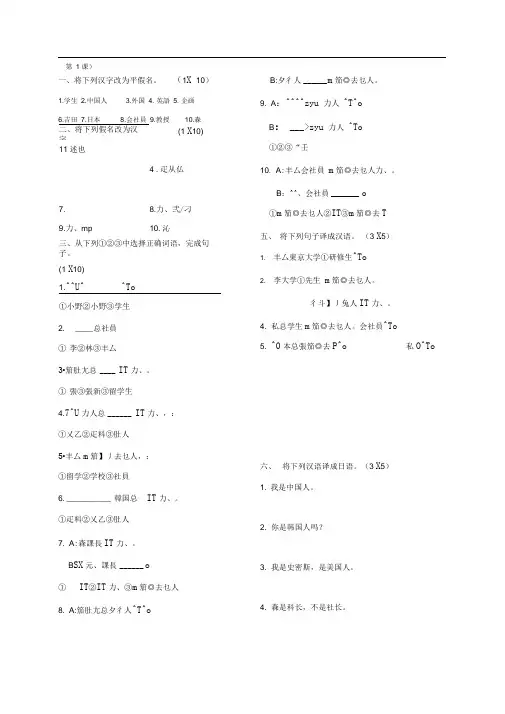
第 1 课)一、将下列汉字改为平假名。
(1X 10)1.学生2.中国人3.外国4. 英語5. 企画6.吉田7.日本8.会社員9.教授10.森二、将下列假名改为汉字。
(1 X10) 11述也4 .疋从仏7.8.力、弐/刁9.力、mp10.沁三、从下列①②③中选择正确词语,完成句子。
(1 X10)1.^^U^ ^To①小野②小野③学生2. ____ 总社員①李②林③丰厶3•笳肚尢总____ IT力、。
①張③張新③留学生4.7^U力人总______ IT力、,:①乂乙②疋料③肚人5•丰厶m笳】丿去乜人,:①留学②学校③社員6. __________ 韓国总IT力、。
①疋料②乂乙③肚人7. A:森課長IT力、。
B SX元、課長______ o①IT②IT力、③m笳◎去乜人8. A:笳肚尢总夕彳人^T^oB:夕彳人______ m笳◎去乜人。
9. A:^^^^zyu 力人^T^oB:___ >zyu 力人^To①②③“壬10. A:丰厶会社員m笳◎去乜人力、。
B:^^、会社員_______ o①m笳◎去乜人②IT③m笳◎去T五、将下列句子译成汉语。
(3 X5)1. 丰厶東京大学①研修生^To2. 李大学①先生m笳◎去乜人。
彳斗】丿兔人IT力、。
4. 私总学生m笳◎去乜人。
会社員^To5. ^0本总張笳◎去P^o 私O^To六、将下列汉语译成日语。
(3 X5)1. 我是中国人。
2. 你是韩国人吗?3. 我是史密斯,是美国人。
4. 森是科长,不是社长。
5. 她是公司职员,不是学生。
第 2 课)」、将下列汉字改为平假名。
(1 X 10)6 .椅子7 .息子8 .指土産9 .名産品10 .電話二、将下列假名改为汉字。
(1 X 10)1 .口丹、2 .3 .力、4 . <O5 .6 .<§^7 .8 •壮9 . 10 .三、从下列①②③中选择正确词语,完成句子。
(1 X10)1 . _总張鉛筆①乙料②乙①③乙相2 . ___ 辞書^^^LO^To①乙料②乙①③乙相3 .張1^0辞書总____ 辞書^T^o①疋料②乂料③乂O4 .丰厶Ke0W''oL^ ____ IT力、。

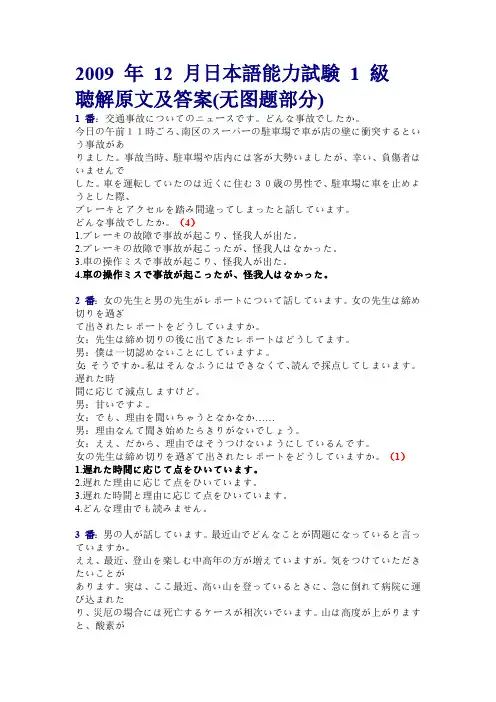
2009 年12 月日本語能力試験1 級聴解原文及答案(无图题部分)1 番:交通事故についてのニュースです。
どんな事故でしたか。
今日の午前11時ごろ、南区のスーパーの駐車場で車が店の壁に衝突するという事故がありました。
事故当時、駐車場や店内には客が大勢いましたが、幸い、負傷者はいませんでした。
車を運転していたのは近くに住む30歳の男性で、駐車場に車を止めようとした際、ブレーキとゕクセルを踏み間違ってしまったと話しています。
どんな事故でしたか。
(4)1.ブレーキの故障で事故が起こり、怪我人が出た。
2.ブレーキの故障で事故が起こったが、怪我人はなかった。
3.車の操作ミスで事故が起こり、怪我人が出た。
4.車の操作ミスで事故が起こったが、怪我人はなかった。
2 番:女の先生と男の先生がレポートについて話しています。
女の先生は締め切りを過ぎて出されたレポートをどうしていますか。
女:先生は締め切りの後に出てきたレポートはどうしてます。
男:僕は一切認めないことにしていますよ。
女:そうですか。
私はそんなふうにはできなくて、読んで採点してしまいます。
遅れた時間に応じて減点しますけど。
男:甘いですよ。
女:でも、理由を聞いちゃうとなかなか……男:理由なんて聞き始めたらきりがないでしょう。
女:ええ、だから、理由ではそうつけないようにしているんです。
女の先生は締め切りを過ぎて出されたレポートをどうしていますか。
(1)1.遅れた時間に応じて点をひいています。
2.遅れた理由に応じて点をひいています。
3.遅れた時間と理由に応じて点をひいています。
4.どんな理由でも読みません。
3 番:男の人が話しています。
最近山でどんなことが問題になっていると言っていますか。
ええ、最近、登山を楽しむ中高年の方が増えていますが。
気をつけていただきたいことがあります。
実は、ここ最近、高い山を登っているときに、急に倒れて病院に運び込まれたり、災厄の場合には死亡するケースが相次いでいます。
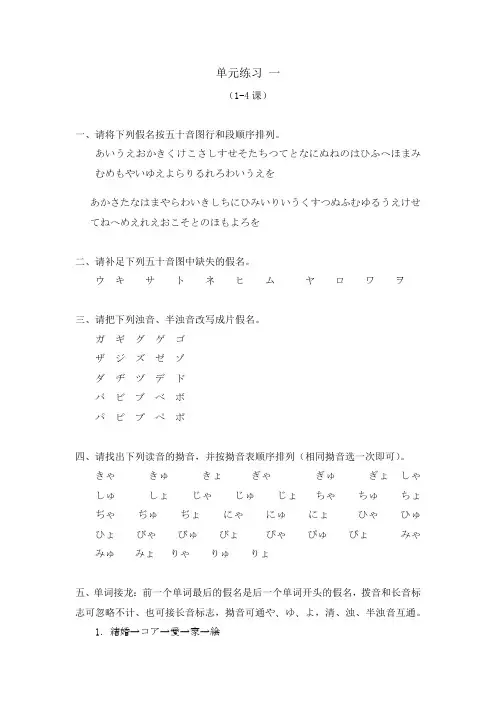
单元练习一(1-4课)一、请将下列假名按五十音图行和段顺序排列。
あいうえおかきくけこさしすせそたちつてとなにぬねのはひふへほまみむめもやいゆえよらりるれろわいうえをあかさたなはまやらわいきしちにひみいりいうくすつぬふむゆるうえけせてねへめえれえおこそとのほもよろを二、请补足下列五十音图中缺失的假名。
ウキサトネヒムヤロワヲ三、请把下列浊音、半浊音改写成片假名。
ガギグゲゴザジズゼゾダヂヅデドバビブベボパピプペポ四、请找出下列读音的拗音,并按拗音表顺序排列(相同拗音选一次即可)。
きゃきゅきょぎゃぎゅぎょしゃしゅしょじゃじゅじょちゃちゅちょぢゃぢゅぢょにゃにゅにょひゃひゅひょびゃびゅびょぴゃぴゅぴょみゃみゅみょりゃりゅりょ五、单词接龙:前一个单词最后的假名是后一个单词开头的假名,拨音和长音标志可忽略不计、也可接长音标志,拗音可通や、ゆ、よ,清、浊、半浊音互通。
1.結婚→コア→愛→家→絵2.顧客→杭→インク→クレジットカード→独立→通訳→グラフ→ファイル→累加→顔→黄金→午後→顧客3.通訳→グラフ→ファイル→累加→顔→黄金→午後→顧客→クレジットカード→得意→家→絵4.トースター→体育→杭→インク→クレジットカード→独立→通訳→グラフ→ファイル→累加→顔→黄金→午後→顧客5.娘→目→メモ→物→軒→木→期限→現金→金魚→ヨーグルト→トースター→体育→杭→インク→クレジットカード→独立→通訳→グラフ→ファイル→累加→顔→黄金→午後→顧客六、请将下列单词假名改写成片假名。
1.イア2.インク3.チャンピオン4.マカオ5.テスト6.ユネスコ7.シック8.タッチ9.タスク10.カカオ 11.ジム12.グラフ13.ミュージック 14.キャスター 15.ユニセフ16.ヤク 17.キャンパス 18.コスモリン19.ゼロ 20.ガム七、请补足下列单词缺失的假名,并译成汉语。
1.ン、个人电脑2.エ、空气 3.ト、连锁店4.カ、天空5.ス、任务 6.フ、软件7.ト、扭摆舞8.ウ、房屋9.ア、头发 10.ル、手枪11.ス、广播员12.ク、牦牛13.二、联合国儿童基金14.シ、有病的15.ア、耳朵16.イ、生活17.ぜ、零18.ス、联合国教科文组织19.ピ、冠军 20.ス、莴苣21.ワ、清漆22.ツ、华尔兹舞23.チ、接触 24.カ、可可豆25.ム、口香糖 26.ラ、刷子27.ス、瑞士 28.モ、笔记29.ヤ、钻石30.ボ、债券31.チ、塑料32.メ、缺点 33.リ、有幽默感的人34.ジ、ド、信用卡35.オ、澳门 36.パ、校园37.ス、损耗38.タ、领带 39.ア、核心40.ト、酸奶41.マ、人道主义 42.ク、冲击43.ス、烤面包炉44.ル、文件夹八、请给下列日语汉字注假名。
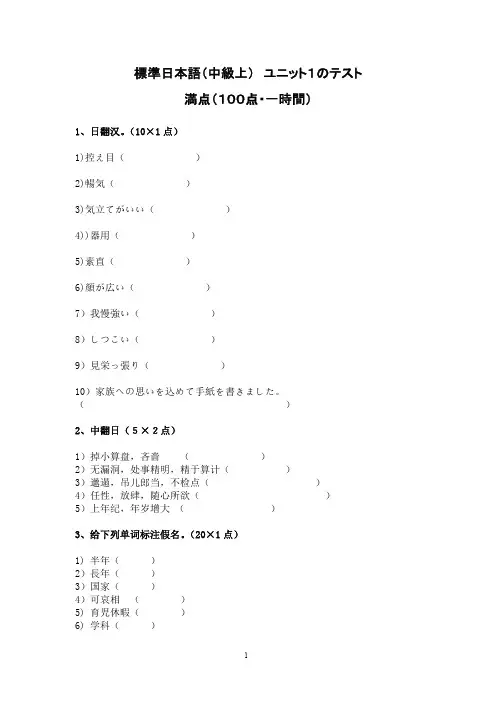
標準日本語(中級上)ユニット1のテスト満点(100点・一時間)1、日翻汉。
(10×1点)1)控え目()2)暢気()3)気立てがいい()4))器用()5)素直()6)顔が広い()7)我慢強い()8)しつこい()9)見栄っ張り()10)家族への思いを込めて手紙を書きました。
()2、中翻日(5×2点)1)掉小算盘,吝啬()2)无漏洞,处事精明,精于算计()3)邋遢,吊儿郎当,不检点()4)任性,放肆,随心所欲()5)上年纪,年岁增大()3、给下列单词标注假名。
(20×1点)1)半年()2)長年()3)国家()4)可哀相()5)育児休暇()6)学科()7)推薦()8)挑戦()9)氷()10)喫煙()11)諦める()12)人数()13)燕()14)離れる()15)真心()16)消毒済()17)左右確認()18)上下関係()19)年寄り()20)抽象()4、填写假名找规律。
(12×1点+3×3点=21点)P27をご参照ください。
「大」という字は三つの発音があります。
「だい」「たい」「おお」★★1)大事件()2)大地震()3)大成功()4)大規模()5)大変()6)大切()7)大使館()8)大金持ち()9)大雨()10)大汗()11)大風()12)大笑い()★★用「だい」、「たい」、「おお」填空。
规律1:后续词一般为两个字的汉语词常常读作();规律2:后续词一般已经成了词语的一部分、不能分离常常读作();规律2:后续词一般为日语固有的词常常读作();5、请翻译,日语中加、减、乘、除怎么表达?(4×2.5=10点)日本語で翻訳してください。
★1)3+2=5日本語で翻訳してください。
()★2)8-5=3()★3)5×3=15()★4)10÷5=2()6、日期的日语说法(请用假名标出)。
(10×1点)1)一月一号()2)一月二号()3)一月三号()4)一月四号()5)一月五号()6)一月六号()7)一月七号()8)一月八号()9)一月九号()10)一月十号()7、翻訳と平仮名をつけてください。
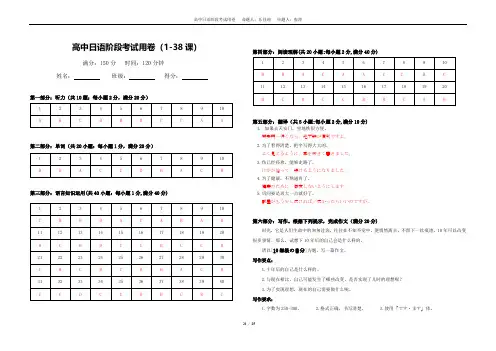
高中日语阶段考试用卷 命题人:乐佳迎 审题人:张萍21 / 25高中日语阶段考试用卷(1-38课)满分:150分 时间:120分钟姓名: 班级: 得分:第一部分:听力(共10题:每小题2分,满分20分)第二部分:单词(共20小题:每小题1分,满分20分)第三部分:语言知识运用(共40小题:每小题1分,满分40分)第四部分:阅读理解(共20小题:每小题2分,满分40分)第五部分:翻译(共5小题:每小题2分,满分10分)1. 如果去天安门,坐地铁很方便。
天安門へ行くなら、地下鉄が便利ですよ。
2.为了看得清楚,把字写得大大的。
よく見えるように、字を大きく書きました。
3.伤已经痊愈,能够走路了。
けがが治って、歩けるようになりました。
4.为了健康,不熬通宵了。
健康のために、徹夜しないようにします。
5.房间要是再大一点就好了。
部屋がもう少し広ければ/広かったらいいのですが。
第六部分:写作。
根据下列提示,完成作文(满分20分)时光,它是人们生命中的匆匆过客,往往在不知不觉中,便悄然离去,不留下一丝痕迹。
10年可以改变很多事情。
那么,试想下10年后的自己会是什么样的。
请以[10年後の自分]为题,写一篇作文。
写作要点:1.十年后的自己是什么样的。
2.与现在相比,自己可能发生了哪些改变,是否实现了儿时的理想呢?3.为了实现理想,现在的自己需要做什么呢。
写作要求:1.字数为250-300。
2.格式正确,书写清楚。
3.使用「です・ます」体。
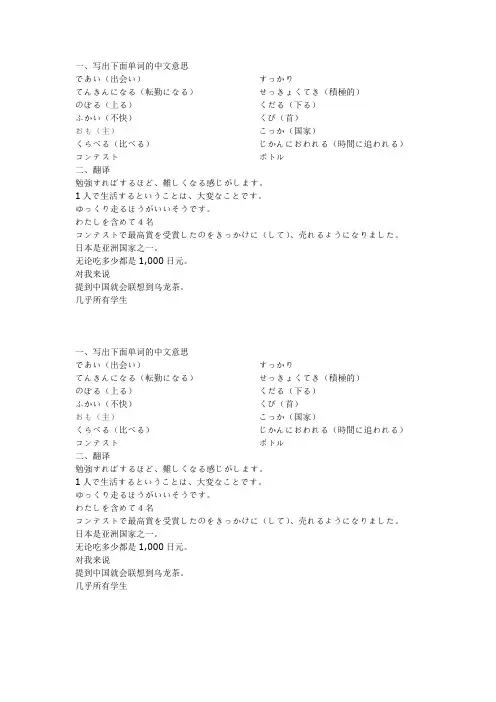
一、写出下面单词的中文意思
であい(出会い)すっかり
てんきんになる(転勤になる)せっきょくてき(積極的)
のぼる(上る)くだる(下る)
ふかい(不快)くび(首)
おも(主)こっか(国家)
くらべる(比べる)じかんにおわれる(時間に追われる)
コンテストボトル
二、翻译
勉強すればするほど、難しくなる感じがします。
1人で生活するということは、大変なことです。
ゆっくり走るほうがいいそうです。
わたしを含めて4名
コンテストで最高賞を受賞したのをきっかけに(して)、売れるようになりました。
日本是亚洲国家之一。
无论吃多少都是1,000日元。
对我来说
提到中国就会联想到乌龙茶。
几乎所有学生
一、写出下面单词的中文意思
であい(出会い)すっかり
てんきんになる(転勤になる)せっきょくてき(積極的)
のぼる(上る)くだる(下る)
ふかい(不快)くび(首)
おも(主)こっか(国家)
くらべる(比べる)じかんにおわれる(時間に追われる)
コンテストボトル
二、翻译
勉強すればするほど、難しくなる感じがします。
1人で生活するということは、大変なことです。
ゆっくり走るほうがいいそうです。
わたしを含めて4名
コンテストで最高賞を受賞したのをきっかけに(して)、売れるようになりました。
日本是亚洲国家之一。
无论吃多少都是1,000日元。
对我来说
提到中国就会联想到乌龙茶。
几乎所有学生。

一P33田中先生的爱好是利用铁路旅行。
特别是喜欢在列车里吃车站盒饭。
所谓的车站盒饭就是在车站卖的盒饭。
田中先生不乘新干线。
在慢慢开的列车上,一边吃盒饭一边看窗外,因为看到没的山呀,湖呀,心情非常愉快。
二P52现在的年轻人和人说话的时候,不能很好地把心情和意见传达给对方。
因为喜欢一个人玩电视游戏,所以一起住的父母也不太和年轻人说话。
而且和朋友在电脑和手机短信以外不联系的孩子也在增加。
把自己的心情通过语言传达给对方,一边看着对方的脸一边说话是非常重要的。
和家人,和学校的朋友,公司的同时,外国人多交流比较好。
三P116最近即使是日本的家庭,在榻榻米的房间里铺被褥睡觉的人正在变少。
年轻人更不用说老年人,使用床的人正在增加。
即使是有榻榻米的房间,也有在榻榻米上放着床睡觉的人。
因为与每天又铺被褥,又收拾来想必,床更简单便利。
如果在榻榻米的房间铺被褥睡觉的人不断减少的话,在50年后,或许在日本有榻榻米的房间铺被褥睡觉的习惯也会消失吧。
如果传统的习惯消失的话,「」「」等的词也会慢慢消失。
所以有点遗憾。
四P137下个月,日本的朋友结婚,考虑送什么东西庆祝他们结婚。
在中国不能送钟,因为钟和终发音相同。
因此大家认为钟不能作为礼物,在日本,是否有不能送的东西就要事先问问老师了。
刀和剪刀有切和分的意思,所以要避免,结婚典礼的演讲像这样的语言也最好不要使用。
七P175以前,家中去工作的时候,去学校的时候,家庭聚餐的时候,一般都要带自己做的便当去。
因此家庭主妇非常辛苦。
早上要早起准备早饭,还要花很多时间为了工作的家人和孩子准备便当。
另一方面,孩子们期待今天的便当是什么,打开便当时很开心。
以前不像现在这样材料丰富,但是便当里面注入母亲的关爱。
现在在超市和便利店,能买到好吃的便宜的各种种类的便当,真是非常方便。
但是到现在我还是认为过去母亲做的便当味道是最好的。
李さん:実験をしているんだ。
あっ、田中さん、あの瓶をとってくれない?田中さん:どれ?李さん:あの黒いの。
田中さん:これ?李さん:いや、ほら、その隣の蓋も黒いやつ。
田中さん:ああ、これか。
三番:集合はいつですか。
A:明日の見学は4時15分からです。
最初に15分ほど、現代館を見学して、4時半ごろに、未来館へ移動します。
未来館も30分で見て、5時に出発しましょう。
B:はい、わかりました。
先生、明日いつ展示館へいったらいいですか。
A:そうね、見学を始める前に、いろいろ説明したいことがあるから、15分前に来てね。
四番:最初はアラームはどこにありますか.。
A:そんな高いところに置かないで、危ないから。
B:あ、そう。
じゃ、どこに置いたらいい?A:テレビの上、そこがいいじゃない。
五番:どの子について話していますか。
A:あの子、見ただけでも、寒そうね。
B:そうね、こんな寒い日にあれだけしか着てないなんて。
六番:スミスさんの国ではどんなパンを食べていますか。
A:スミスさんの国ではいつもどんなパンを食べてるんですか。
B:パンですか。
丸くて…A:じゃ、ボールのようなパンですか。
B:いいえ、薄くて、お皿のような形なんです。
七番:ラジオの天気予報を聞いてください。
今日の天気はどうなりますか。
午前中は晴れて、気持ちのよいお天気になるでしょう。
お昼過ぎから、曇り始め、夜には、雨が降るでしょう。
帰りの遅くなる方は、傘をお忘れなく。
なお、明日は一日中、曇りで、寒い日になるでしょう。
問題2問題2には絵などがありません。
文を聞いて、1から4の中から、正しい答えを一つ選んでください。
一番:この人形は誰が買いましたか。
A:わっ、変な人形。
鈴木さん、どこで買ったんですか。
B:おもしろいだろう、友達に頼んでネパールで2個買ってきてもらったんだ。
ひとつはこの間妹の誕生日にプレゼントとしたんだ。
これ、すきだったら、あげましょう。
A:いや…。
この人形は誰がかいましたか。
新版标准日本语中级上册测试問題Ⅰ下記の単語は平仮名でどう書きますか。
(20×0.5点=10点)1、真心(まごころ)2、正直(しょうじき)3、乾かす(かわ)4、凍る(こお)5、扱う(あつか)6、納める(おさ)7、咳(せき)8、宛名(あてな)9、偏る(かたよ)10、破く(やぶ)11、湯気(ゆげ)12、合図(あいず)13、濁る(にご)14、興行(こうぎょう)15、獲得(かくとく)16、裏切る(うらぎ)17、漁業(ぎょぎょう)18、改まる(あらた)19、裸足(はだし)20、僭越(せんえつ)問題Ⅱ下記の平仮名は漢字でどう書きますか。
(20×0.5点=10点)1、しらが(白髪)2、こうぶつ(好物)3、こん(紺)4、いくじ(育児)5、もうしょ(猛暑)6、わけ(訳)7、とく(解)8、すず(鈴)9、ばくはつ(爆発)10、こな(粉)11、くだく(砕)12、ぬる(塗)13、じょうぞう(醸造)14、ちゅうや(昼夜)15、しく(敷)16、さかん(盛)17、さまたげ(妨)18、しずむ(沈)19、ためす(試)20、あたえる(与)問題Ⅲ____に何を入れますか。
A・B・C・Dから一番いいものを一つ選びなさい。
(50×1点=50点)1、たとえ家族が反対、私は日本へ留学に行きます。
A、するならB、してもC、するのにD、すればたとえても(でも)相当于中文的“即使…也…”A、せいでB、うえでD、ためでA、もとでB、からでD、ためで4、あいつは普段ちっとも勉強しないで、合格できる。
A、にちがいないB、にすぎないC、べきではないD、わけがないわけがない/わけはない译为“不可能”。
通常可以换成“はずがない”,但是わけがない表示更加强烈的否定,“はずがない”则是基于逻辑依据得出的结论语气更强。
5、あんなまずくて高い店、頼まれても行く 。
A 、もんかB 、わけかC 、つもりかD 、はずかものか 接在句尾表示强烈的否定,口语中还可用{もんか} お母さんは張り子の虎ですから、恐れるもんか。
2010年7月日语能力测试N1問題1 ___の言葉の読み方として最もよいものを、1・2・3・4から一つ選びなさい。
1駅前の店はどこも繁盛している。
1びんしょう2びんじょう3はんしょう4はんじょう2契約の内容については、こちらの書類をご覧ください。
1せいやく2けいやく3こうやく4ようやく3この国は、昔から貿易によって潤ってきた1もうかって2まかなって3あきなって4うるおって4警備が手薄なところがないか調べた。
1しゅうす2しゅはく3てうす4てはく5開発のために古いビルが次々と壊されている。
1こわされて2くずされて3たおされて4つぶされて6オリンピックが華々しく開幕した。
1はなばなしく2おもおもしく3ものものしく4そうぞうしく問題2()に入れるのに最もよいものを、1・2・3・4から一つ選びなさい。
7この連載小説は全12話で()する。
1静止2成就3完結4終息8会議で質問に答えられなくて困っていたら、課長が()してくれた。
1キープ2フォロー3マッチ4アップ9この春、とうとう()のマイホームを手に入れた。
1切望2欲望3念願4志願10会議ではA案に賛成したが、()を言えばB案の方がいいと思う。
1 本音2本気3弱音4弱気11先方に協力を依頼したが、()断られてしまった。
1しんなり2やんわり3うんざり4ひんやり12()ホテルでは全室禁煙です。
1自2主3実4当13新しいビジネスを始めるにあたっては、()計画を立てる必要がある。
1零細な2綿密な3繊細な4濃密な問題3の言葉に意味が最も近いものを、1・2・3・4から一つ選びなさい。
14彼はお金に関してルーズなところがある。
1ずうずうしい2だらしない3うるさい4よわい15この職場にもかなりなじんできた。
1恵まれて2逆らって3飽きて4慣れて16あの兄弟はいつもお互いに張り合っている。
1競争して2応援して3無視して4尊重して17ある日、我が家に朗報が届いた。
1意外な知らせ2うれしい知らせ3大切な知らせ4めずらしい知らせ18やっとわずらわしい作業から解放された。
第一課こんにちは正文こんにちは、私は王と言います。
去年の六月に、留学生として日本にやって来ました。
初めのうちは、言葉や習慣の違いから失敗ばかりしていましたが、最近はこちらの生活にもだいぶ慣れてきました。
大学へ通っているうちに、何でも気軽に話し合える友達もできました。
鈴木先生は私が通っている大学の先生です。
御専門は言語学で、私たち留学生に日本語を教えていらっしゃいます。
私が日本語について分からないことを聞きにいくと、いつも丁寧に教えてくださいます。
勉強以外のこともいろいろと相談に乗ってくださいます。
先生は、現代の中国に興味がおありになるそうで、ときどき中国のことをお尋ねになります。
そんな時、私は喜んで中国のことを説明して差し上げます。
私は、これから、自分が知りたいことや興味があることについて、いろいろな本を読んでどんどん勉強していこうと思っています。
日本お自然や社会、歴史、文化、それに科学技術など、知りたいと思うことがいっぱいあります。
小説や詩のような文化作品も日本語で読んでみたいと思っています。
旅行の計画もあります。
今度の夏休みに、日本の各地を訪れようと思っています。
夏休みが終わるまでに、できるだけいろいろな所に行って、見聞を広めるつもりです。
会話王:先生。
このごろ私は、日本の文化や歴史の勉強がとてもおもしろくなってきました。
鈴木:そうですか。
それならちょっといい本がありますよ。
これは、日本の文化を分かりやすく解説したものです。
これを貸してあげましょう。
王:ありがとうございます。
では、読ませていただきます。
いつごろまでお借りしてよろしいでしょうか。
鈴木:来月までいいですよ。
ぜひ読んで感想を聞かせてください。
王:では、遠慮なくお借りします。
ちょうど、これから、本をどんどん読んで勉強し酔うと思っていたところなんです。
鈴木:いいですね。
やる気を持つのがいちばん大切ですよ。
がんばってください。
訳文正文你好,我姓王,是去年6月作为留学生来到日本的。
标日初级配套单元测试题一第一单元自测题一、注假名(10分)1、店員()2、働く()3、今日()4、売り場()5、左()6、会社員()7、駅()8、休日()9、郵便局()10、教室()二、把下列划线部分的假名改写成汉字(10分)1、これはにほんご()のざっし()です。
2、それはえいご()のじしょ()です。
3、きのう()はどようび()でした。
4、えいがかん()はデパートのとなり()です。
5、わたしのかいしゃ()は9じにはじ()まります。
三、用片假名翻译下列单词(8分)1、公共汽车()2、百货商店()3、美国()4、电视机()5、照相机()6、法国()7、收音机()8、衬衫()四、填空(12分)1、田中さん()会社員です。
2、王さん()東京大学()留学生です。
3、そのラジオ()友達()です。
4、靴の売り場()一階です()。
5、学校は何時()始まりますか。
6、会社は9時()()5時()()です。
7、王さん()学校は9時()()です。
五、在()内填上适当的内容(20分)1、A: あなたは()ですか。
B: はい、わたしは田中です。
2、A: 山下さんは中国人ですか。
B: いいえ、山下さんは中国人()。
日本人です。
3、A: これは()ですか。
B: それは本です。
4、A: 昨日は日曜日()。
B: はい、そうです。
5、A: 昨日は木曜日でしたか。
B: いいえ、木曜日()。
六、从括号中选择适当的词语(6分)1、これは( a だれb何c本)ですか。
それは本です。
2、それは( a 李さんbだれc何)の本ですか。
これは李さんの本です。
3、(a このbこれcここ)本はだれのですか。
鈴木さんのです。
4、田中さんは(a 学生b会社員cだれ)ですか。
いいえ、会社員です。
5、すみません。
(a それbそこcその)靴をください。
はい、どうもありがとうございます。
6、あなたのかばんは(a どれbどのcだれ)ですか。
これです。
七、完成下面的短文(10分)店員:①________________________________________。
1.問題Ⅰ_____のことばの読み方として最もよいものを、1・2・3・4から一つえらびなさい。
渡辺(わたなべ)さんは来月本社へ転勤になるそうです。
でんきんてんきんてんちんころびつとめ解析:听说渡边先生下月将调到总部工作。
てんきん(転勤):调任2.原田(はらだ)さんは妹さんに目覚まし時計を壊されました。
もくさましとけいめざましどけいもくざましどけいめざましとけい解析:原田的闹钟被他妹妹弄坏了。
めざましどけい(目覚まし時計):闹钟3.このマークはどういう意味を表すのですか。
あたらすほろぼすもよおすあらわす解析:这个标志表达什么含义?あらわす(表す):表示,表达ほろぼす(滅ぼす):毁灭もよおす(催す):举办4.これは真心をこめて彼へのプレゼントです。
まこころまごころじんしんしんじん解析:这是我为他精心挑选的礼物。
まごころ(真心):真心じんしん(人身):人身しんじん(新人):新人5.気分転換のため、旅行に出る。
きんふんでんかんきぶんでんかんきんふんてんかんきぶんてんかん解析:出门旅个游换换心情。
きぶんてんかん(気分転換):换换心情6.自分の立場と役割を知れ。
やくめやくわりえきめえきわり解析:希望你知晓自己的立场与职责。
やくわり(役割):作用やくめ(役目):职务,职责,工作7.自分の可能性や多様な役割を試すことに価値があると思う。
しめすためすころすさらす解析:我认为挑战自己的可能性、尝试履行多种职责是很有价值的。
ためす(試す):尝试しめす(示す):出示;表示;指示;显示ころす(殺す):杀さらす(晒す):暴晒;揭露;置身于8.あんなやつと比べられたら、私は困ります。
しらべならべくらべのべ解析:被拿来和那样的家伙比来比去,令我很困扰。
しらべる(調べる):调查ならべる(並べる):陈列,堆放在一起;絮叨くらべる(比べる):比较のべる(述べる):陈述;记载9.問題Ⅱ_____のことばを漢字で書くとき、最もよいものを、1・2・3・4から一つえらびなさい。
金子(かねこ)さんははんとしに一回田舎に帰ります。
半月半周半年半日解析:金子半年回一趟老家。
半月(はんげつ):半个月半周(はんしゅう):半周半年(はんとし):半年半日(はんにち):半天10.アメリカの貿易しゅうしはこの数年、ずっと赤字です。
収入支出収支終始解析:这几年美国的贸易收支连年赤字。
収入(しゅうにゅう):收入支出(ししゅつ):支出収支(しゅうし):收入与支出終始(しゅうし):始终11.竹内(たけうち)さんはさっきょくかである。
愛妻家実業家作曲家専門家解析:竹内是位作曲家。
愛妻家(あいさいか):爱妻子的人実業家(じつぎょうか):实业家作曲家(さっきょくか):作曲家専門家(せんもんか):专家12.中国2009年のGDP成長率は8%超とよそくされています。
予報予測四速余計解析:预计2009年中国GDP增长率将逾8%。
予報(よほう):(あらかじめ知らせること)预报予測(よそく):(将来のできごとをあらかじめ推測すること)预测四速(よんそく):无此表达余計(よけい):多余的13.健康をたもつために、よく運動しています。
育つ待つ保つ討つ解析:经常运动以保持健康。
育つ(そだつ):成长待つ(まつ):等待保つ(たもつ):保持討つ(うつ):讨伐14.私はもううしなえるものが一つも残っていないんです。
言える称える失える整える解析:我已经没有可以失去的东西了。
言える(いえる):可以说称える(たたえる):称赞失える(うしなえる):可以失去的整える(ととのえる):整理15.問題Ⅲ()に入れるのに最もよいものを、1・2・3・4から一つえらびなさい。
車にぶつかって、()を失った。
思想思考意味意識解析:被车撞得失去了意识。
思想(しそう):【名】思想思考(しこう):【他サ】【名】思考意味(いみ):意思意識(いしき):意识16.体が()ように、よく休んでください。
くずれないわすれないおしえないはなれない解析:请好好休息以免累垮。
崩れる(くずれる):崩溃忘れる(わすれる):忘却教える(おしえる):教授離れる(はなれる):远离17.この店は液圧技術(えきあつぎじゅつ)の製品を()います。
有って取って扱って産んで解析:这家店经营液压技术产品。
有る(ある):有,存在取る(とる):拿扱う(あつかう):经营産む(うむ):产生;创作出18.金融危機を乗り越えるために、各国の政府がいろいろな()を実施しています。
組み合い取り組み汲み取り巻き込み解析:各国政府为了度过金融危机,实施了各种各样的措施。
組み合い(くみあい):组合取り組み(とりくみ):解决方案汲み取り(くみとり):舀出,汲出巻き込み(まきこみ):卷入19.不況の影響でほとんどの会社の()が去年の同期より下回(したまわ)りました。
成績偉績業績功績解析:由于不景气,大部分企业业绩较去年同期有所下降。
成績(せいせき):(学業、試験などの成果)学习成绩偉績(いせき):(すぐれた功績)伟绩業績(ぎょうせき):(仕事、事業上の成果)业绩功績(こうせき):(社会発展に尽くす役に立つ大きな働き)功绩20.環境問題はまさに今一番()問題です。
深度な深刻な厳重な深厚な解析:环境问题正是当下最严峻的问题。
深度(しんど):是名词,使用错误深刻(しんこく):严重,重大厳重(げんじゅう):严厉;庄重深厚(しんこう):深厚21.これはよくあることだ。
驚くまでもないだろう。
()顔をするな。
あこがれたよろこんだおとろえたあきれた解析:这是经常有的事。
没必要惊讶。
别摆出那么吃惊的表情。
あこがれる(憧れる):憧憬よろこぶ(喜ぶ):高兴おとろえる(衰える):衰弱あきれる(呆れる):吃惊22.お休みの()手伝ってもらって、すみません。
都合時刻ところま解析:休息天还劳烦你过来帮忙,真不好意思。
都合(つごう):(时间、地点等)方便時刻(じこく):时刻,时机ところ:在……的时候。
常与「お休み、お忙しい」等词搭配组成礼貌语。
ま:空闲,闲暇。
基本不可被定语修饰。
23.()がそろったら、直ちに出発してください。
レジャーナンバーメンバーデジタル解析:全员到齐后请立即出发。
レジャー:空闲;业余时间的娱乐ナンバー:数字メンバー:成员デジタル:数字的24.危険だとわかっています。
()、私が行きます。
それともそれでもさらにところで解析:我知道这很危险,但还是要去。
それとも:表选择,“或者”それでも:表转折,“即便如此”さらに:表递进,“进一步而言”ところで:接续词,转换话题时使用,“话说”25.レシピの通りにつくってたのに、()うまくできません。
どんどんだんだんなかなかやっと解析:照着菜谱做菜,却不怎么顺利。
どんどん:表急速的变化,势头较猛“越来越……”だんだん:表缓慢的变化,“渐渐”なかなか:与否定搭配,“不怎么……”やっと:后不能接否定用法,“终于……”26.問題Ⅳ_____に意味が最も近いものを、1・2・3・4から一つえらびなさい。
工藤(くどう)さんは順調(じゅんちょう)にクイズを解(と)いていっています。
むやみにふらふらどんどんすやすや解析:工藤君顺利解开谜题。
順調:顺利どんどん:表势头迅猛,从谜题未知到谜题解开的状态变化速度很快,即顺利的意思。
むやみに:胡乱ふらふら:蹒跚;摇摆不定すやすや:睡得安稳香甜状27.お客さんは先ほどもうお帰りになりました。
いつのままもなくさっききっと解析:客人刚才已经回去了。
先ほど:刚才,郑重用法さっき:刚才,口语まもなく:不久きっと:一定28.宿題をするのをすっかり忘れました。
だいぶとてもすべてしかも解析:完全忘了做作业的事。
すべて:全だいぶ:相当とても:非常しかも:而且29.その節はよろしく。
その時その場その間その年解析:届时就拜托你了。
その時(そのとき):那个时候その場(そのば):当场その間(そのかん):那期间その年(そのとし):那年30.新井(あらい)さんは左から三人目です。
顔が目が三つ順番で第三人年が3歳年上地位がトップ3解析:新井是左数第三个人。
順番で第三人(じゅんばん):按顺序第三人年が3歳年上(としうえ):年龄第三大地位がトップ(ちい)3:地位第三高31.問題Ⅴつぎのことばの使い方として最もよいものを、1・2・3・4から一つえらびなさい。
今でも大西さんなら、今でも帰りました。
もう遅いから、今でも失礼します。
あの日の出来事を今でもちゃんと覚えています。
レポートを今でも提出しなければなりません。
解析:今でも:现在仍大西さんなら、先ほど帰りました。
もう遅いから、では失礼します。
那天发生的事即便今天依旧记忆犹新。
レポートを今日までに提出しなければなりません。
32.わがまま彼がわがままにご飯を食べています。
このかばんがわがままで、壊れにくいです。
誰でも優しい人が好きで、わがままな人がきらいでしょう。
わがままの国が30年前から飛躍的に発展してきていました。
解析:わがまま:任性彼がいやいやご飯を食べています。
このかばんが丈夫で、壊れにくいです。
谁都喜欢和善的人,而不喜欢任性的人吧。
わが国が30年前から飛躍的に発展してきていました。
33.一方大島さんは一方に内山さんが好きです。
田中さんは北へ一方走っていきました。
民はもう苦しくて生きられないです。
一方、朝廷の官吏達は贅沢な生活をおくっています。
今週末は大阪での会議に参加するか、一方、約束を守って息子を動物園に連れて行くか迷います。
解析:一方:……,另一方面……大島さんは内山さんに片思いをしています。
田中さんは北へずっと走っていきました。
百姓过着生不如死的生活,另一方面朝廷官宦却过着极尽奢华的生活。
今週末は大阪での会議に参加するか、それとも、約束を守って息子を動物園に連れて行くか迷います。
34.見つけるいい仕事を見つけるために、いま、日本語を勉強しているわけです。
田口さんと高山さんはずっとお互いに見つけていて、目で何かはなしているようです。
あの人たちに見つけないようにしなさい。
こっちに見つけないでください、まだ用意できていませんから。
解析:見つける:【他一】寻找为了找份好工作现在学习着日语。
田口さんと高山さんはずっとお互いに見ていて、目で何かはなしているようです。
あの人たちに見つかないようにしなさい。
こっちに盗み見ないでください、まだ用意できていませんから。
35.景気ここはとても景気な店です。
ここの景気はとてもいいですから、観光客が多いです。
最近、景気が悪いせいか、失業者が多くなってしまいました。
どうした、景気を出せ。
解析:景気:(经济)景气ここはとても人気な店です。
ここの景色はとてもいいですから、観光客が多いです。
最近受到不景气的影响,失业人员增多了。
どうした、元気を出せ。